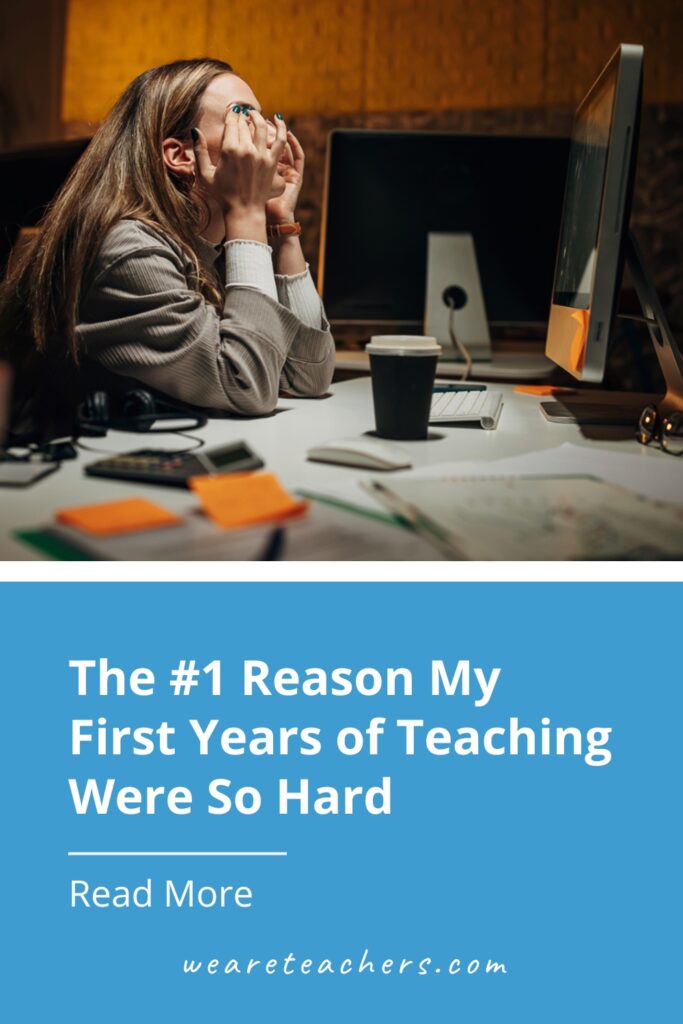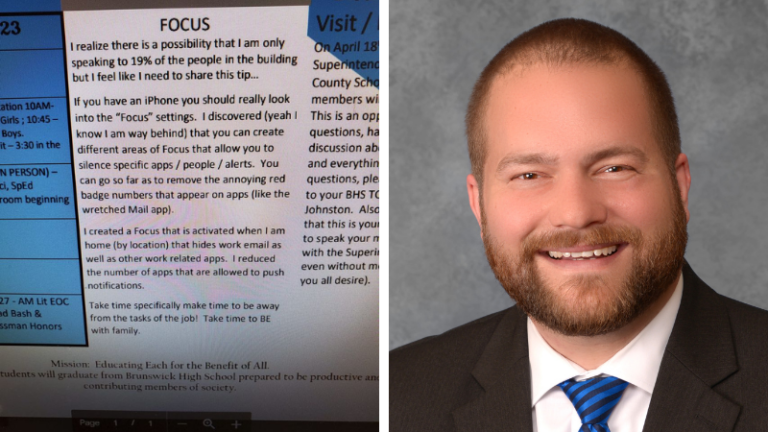The early years of teaching, but especially the first year, have a ton of moving parts that make them difficult. It isn’t just learning how to teach, which is a struggle enough on its own. There’s an emotional load. A physical toll (often exacerbated by the emotional load). The anxiety when you recognize the overwhelming influence that a number of messed-up systems have on students, teachers, and schools—and how powerless it feels being up against them.
In my third year of teaching, I reached a point where I knew I needed professional help. The stress of teaching and some shaky personal struggles had morphed into what felt like one huge glacier that I was powerless to stop. I started seeing a therapist, who said to me, “Let’s work on naming this. What about all of it feels the hardest?”
I began to tell her. I think in many ways it’s the story of a lot of new teachers.
On top of all the things they’re learning, new teachers are often experiencing a startling identity shift.
For many of us in teaching, there comes a point when the self you thought you were is no longer there.
For me and my privileged upbringing, it was the self who’d always had easy, accessible, work-throughable solutions to problems. The self who was able to get the hang of anything—difficult professors, a conditioning class, the subjunctive in Spanish—after a few weeks of hard work and determination.
It was the self who, if hard work and determination didn’t work, knew there was always recourse. Office hours. A customer service line.The notion that If I can’t fix this, someone else can help me. That there was always someone with more power than me who could make it right.
I missed the self who felt fun. The self who had time for their interests, boundless energy for socializing, and mental space left over to remember birthdays, check in with loved ones, and care for their community.
The self who believed—even if they wouldn’t describe it this way—that with enough hard work, love, and elbow grease, they could be the change.
Where was she? And who was this disillusioned, bitter, fragile, supremely un-fun person who took her place?
It is terrifying to realize you don’t recognize the self you thought you knew.
It’s scary when the things you’d built your life and identity on start to erode.
What happens to your sense of agency when no one in your school or in your district’s central administration is surprised or alarmed that you have an eighth grader who is completely illiterate?
When you realize your students aren’t learning because they have massive gaps in foundational knowledge—ones far too wide for you to bridge in a single year?
Or what about the recognition that things you loved no longer bring you joy—or when the thought of pursuing them sounds impossible because of how deeply tired you are?
What happens when you begin to deconstruct everything you thought you knew about teaching, or maybe even the larger world … and your place in it?
I didn’t feel capable or smart. I didn’t feel fun or warm or kind. Instead, I felt tired, irritable, cynical, and—recognizing that I was powerless against the forces holding my students back—I was jaded. Who was this person?
If this sounds familiar, let me stop for a moment and recommend seeking guidance from a mental health professional.
I know it might seem like just one more burden. Working in the time, cost, and anticipation of therapy can be intimidating. I, too, have had to do that math while I was teaching and paying off student loans. But for me, no amount of yoga, wellness, or other forms of self-care will ever come close to the healing I experienced from real mental healthcare.
Years ago, I wrote about how hard the first few years of teaching were for me and said that new teachers are grieving the deaths of their former selves. I no longer think that wording is appropriate.
Instead, I think a more accurate way of describing the first years of teaching is an identity shift. A transformation into someone who has learned really important, hard lessons about themselves and the world—but who is a better person for it. I think a lot about Little Red Riding Hood’s song “I Know Things Now” in Sondheim’s musical Into the Woods: “Isn’t it nice to know a lot? And a little bit … not?”
My old self hadn’t died. I was just growing up.
With my therapist’s help, I learned to embrace this identity shift even as it was happening.
I don’t know if you know this, but transformation isn’t fun. (All the butterflies reading this are like, “What did you think we do in cocoons, relax? Do face masks?!”)
Learning to appreciate the changes that were happening as a necessary part of growth was huge. It helped me be less afraid or alarmed by the changes I was seeing in myself and more grateful for them. People in schools see the intersection of unfair systems—healthcare, housing, education, welfare—and how it fails our kids. But instead of surrendering to that sadness, I started saying I’m so grateful to be connected to humanity in this way. Instead of charging myself with the unrealistic and problematic perspective that I had to change the lives of my students, I started thinking I am so grateful for the way they are changing me. And when I would catch myself longing for the carefree self I was before I started teaching, I would switch to gratitude for the new compassion, empathy, and even anger I had now that drove me forward.
My therapist didn’t make the glacier go away. Instead, she handed me an ice pick and held my backpack for me so that I could get to work. I knew I had a lot of work ahead of me, but over time I realized, This won’t consume me. That was by far the greatest gift. The glaciers come and go now. But I am freaking unstoppable with an ice pick.
I wish teacher training would focus a little less on the lives teachers are going to change and focus more on how our lives will change.
I’m not the same person I was before I started teaching.
For me, that’s a net good.
For more articles like this, be sure to subscribe to our newsletters.


